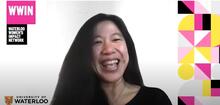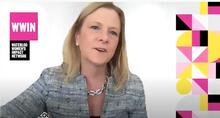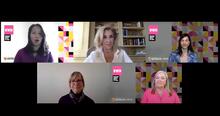Alumni from Canada, the US, Mexico, Costa Rica, Great Britain, Norway, Switzerland and Australia joined together for a virtual celebration of International Women in Mathematics Day on May 12. They attended virtual coffee, multiple panels, a screening of Secrets of the Surface: The Mathematical Vision of Maryam Mirzakhani and connected on social media with the hashtag #IAmGoodAtMath and on the Waterloo Math Digital Community. Overall, the Faculty’s digital celebration helped nearly 450 attendees connect and engage with one another. It even saw special guests, including Prime Minister Justin Trudeau, make an appearance to mark this special occasion.
The speakers ranged from faculty members, alumni of the Faculty of Mathematics and friends. Some rebelled against studying math and ended up there despite themselves; some loved the challenge; some didn’t know where it would take them. They all agree that their math education gave them a different way of thinking that is logical, rigorous and detailed.
Step outside your comfort zone
 For many women, although they felt comfortable with math, they found it challenging to step into classrooms, meetings and board rooms as one of the few women, and sometimes the only woman. Many of the day’s panelists broke the glass ceiling by learning to take risks, building their confidence and travelling to another continent with their family to start a new job.
For many women, although they felt comfortable with math, they found it challenging to step into classrooms, meetings and board rooms as one of the few women, and sometimes the only woman. Many of the day’s panelists broke the glass ceiling by learning to take risks, building their confidence and travelling to another continent with their family to start a new job.
At some point, the imposter syndrome prevails. Professor Anita Layton, Canada 150 Research Chair in Mathematical Biology and Medicine, shared that different social and cultural pressures instill in us that women can’t do mathematics. Still, you just have to keep overcoming it. To do that, you have to step outside your comfort zone.
Our speakers advised that you can’t be afraid to work hard to step out of your comfort zone. Sherry Shannon-Vanstone studied mathematics at the undergraduate and graduate levels and started selling technology. Travelling the world, she still commanded respect in meetings with customers because of her technical knowledge. She told listeners that she tries to live by Eleanor Roosevelt’s words: “Do one thing every day that scares you.”
That’s what creates impact.
It’s about people
Whether you’re leading or following, a mentor or a mentee, the people you choose and how you treat them matters. The lack of female role models could often act as a barrier, though it pushed our speakers to strive for diversity in their teams. Once many of them made their way to the board room, they ensured that every part of the organization they were involved with was diverse.
 Surrounded by great people, Susan Heystee (BMath ‘86) found that those around her provided multiple perspectives and helped her stay strategic. At every stage of her career, she maintained a network of mentors who acted as a sounding board or offered a helping hand.
Surrounded by great people, Susan Heystee (BMath ‘86) found that those around her provided multiple perspectives and helped her stay strategic. At every stage of her career, she maintained a network of mentors who acted as a sounding board or offered a helping hand.
Heystee also reported that it’s about checking yourself, asking: Who am I? What do I stand for? What’s my personal brand? She believes that if you surround yourself with people who fit with your values yet have different perspectives, they will impact you, and you, in turn, will impact them.
Giving back
 Jeannie Sager, Director of the Women’s Philanthropy Institute, Indiana University Lilly Family School of Philanthropy, encouraged everyone to harness their power to do good and to expand what their definition of doing good is. The Institute researches gender and philanthropy and found that women like to give collectively – the Waterloo Women's Impact Network, introduced as part of the event, was an example of this.
Jeannie Sager, Director of the Women’s Philanthropy Institute, Indiana University Lilly Family School of Philanthropy, encouraged everyone to harness their power to do good and to expand what their definition of doing good is. The Institute researches gender and philanthropy and found that women like to give collectively – the Waterloo Women's Impact Network, introduced as part of the event, was an example of this.
We think of giving back as donating money; however, doing good is about more than that. It could be giving your time, adding your voice to a board, or getting involved in initiatives like Women in Mathematics and Women in Computer Science. Each person needs to find their unique voice and make an impact. Giving back helps organizations do things they’ve never done before, provides mentorship, and help where it’s needed, but for the one giving, there are new ways to learn and people to meet, find ways to shift careers, and it can be incredibly fun and rewarding. Doing good makes an impact on the organization and the people it serves, and on you.
Being good at math opens doors to a wide variety of options and success. Based on the diversity of speakers we heard from, there is no one size fits all for success, though, as Layton reminded us, do what you love.
We look forward to celebrating the next International Women in Mathematics day – May 12, 2021 - with our WWIN members, partners, faculty and friends.
We invite you to watch the recordings from each session below.
Virtual Coffee with Canada 150 Research Chair in Mathematics
This very special component aims to showcase the interesting (and topical) research of Professor Layton, the research strengths in the Faculty (and Waterloo) and the important contributions and voice of women in research, both for themselves and for the greater good of the industry.
Keynote: Women Changing the World: A Conversation on the Power of Doing Good
This important panel discussion will showcase women’s growing influence as drivers of change through gifts of their time, talent, treasure and testimony. This discussion aims to inspire and bolster community leaders – seasoned or aspiring – to consider the potential of their own impact big and small.
The Art of Leadership Executive Panel
This very special panel aims to share knowledge and expertise from business leaders that will help alumnae and students respond to today’s evolving business landscape, and advance and flourish in their careers. Topics covered include: exerting influence, authentic executive presence, building resilience, and the importance of networking.
Entrepreneurship & Intrapreneurship and the Driving Force of Innovation
Women face unique challenges in business but they also add unique value and perspective. This session will be a rare and exclusive glimpse into our entrepreneur and intrapreneur’s journeys, how they overcame movements of self-doubt and bias, how they leveraged creativity to solve problems and overcome hurdles, the importance of social-good or purpose and how their background in mathematics and computing has been an advantage in their innovative journey.
Coronavirus: How Math is Helping to Answer Crucial COVID-19 Questions
Mathematics, statistics, computational sciences and artificial intelligence are playing a key role in assessing transmission risk, predicting outbreak trajectories and evaluating the effectiveness of countermeasures to control the virus. This session touches on how various mathematical branches are critical in the on-going effort to manage the spread of COVID-19.





